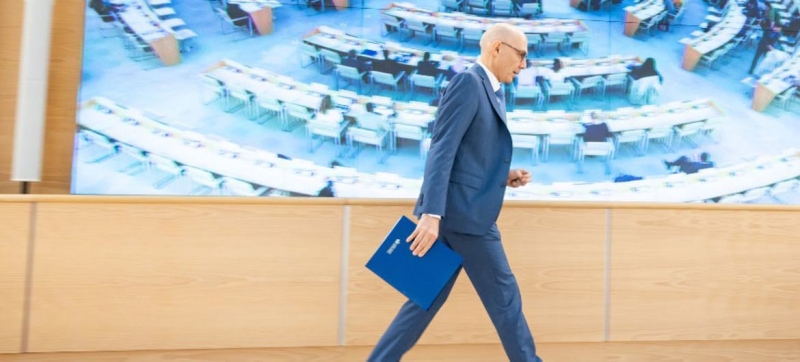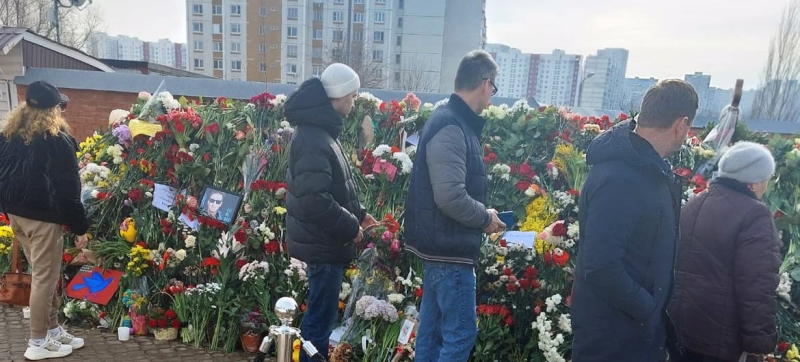
Volkre Türk at the 55th session of the HRC in Geneva. Volker Türk about the war in Ukraine and repressions in Russia International Law
Humanity has rarely faced so many rapidly growing crises. A wave of conflicts is destroying the lives of people around the world. Chief UN human rights activist Volker Türk said this at a session of the UN Human Rights Council on Monday.
“There are 55 conflicts in the world. Widespread violations of international humanitarian law and human rights are having a devastating impact on millions of civilians. Population displacement and humanitarian crises have already reached unprecedented proportions. And all these conflicts have regional and global consequences,” Turk said.
The war in the Gaza Strip could have explosive consequences for the entire Middle East, Turk noted. Conflicts in the Horn of Africa, Sudan and the Sahel region could also escalate sharply. There is an increase in militarization on the Korean Peninsula. Türk also stressed that attacks in the Red Sea and Black Sea pose serious problems for the global supply of goods, exacerbating the economic problems of developing countries.
War in Ukraine
In the two years since Russia’s full-scale invasion of Ukraine, more than 10 thousand civilians have been killed and tens of thousands injured. The real numbers are likely much higher, Turk said. In Russia, according to information obtained from open sources, 147 civilians were killed during the same period.
Militations have escalated again recently, with Russian missile and drone attacks leading to a sharp increase in civilian casualties across Ukraine, Turk recalled.
“In the occupied territory of Ukraine, repeating the processes observed on the occupied Crimean peninsula in 2014-2015, the Russian Federation introduced its own legal and administrative systems – in violation of international humanitarian law,” Turk said. According to him, the repressive measures taken by the Russian Federation keep the population of the peninsula in fear. The UN High Commissioner for Human Rights will speak in more detail about the situation in Crimea on March 28.
Russia: repression before the elections
In the Russian Federation, authorities have further intensified repression against dissent ahead of the presidential elections, Turk said. He recalled the death of opposition leader Alexei Navalny in prison, as well as the fact that several candidates were not allowed to run due to alleged administrative violations.

People lay flowers on the grave of Alexei Navalny.
“Since the start of Russia’s war with Ukraine, thousands of politicians, journalists, human rights activists, lawyers and people who simply expressed their opinions on social networks have faced administrative and criminal charges, and this trend seems to have worsened in recent years months, many cultural figures have become the target of persecution,” Turk said.
“Last month, a new bill was passed that further punishes people convicted of disseminating information about the Russian military that is considered false, as well as people who seek to comply with the decisions of international organizations in which the Russian Federation “does not participate”,” – he added.
He called on the authorities to immediately stop repressing anyone who expresses an independent opinion and the lawyers who represent such people. Türk emphasized that the future of the country depends on the presence of “open space” for the opposition.
Elections in more than 60 countries and the participation of women in politics
Turk also recalled that elections are being held this year in more than 60 countries, where about half of the world’s population lives, and emphasized that 2024 could be a landmark year for democratic principles.
According to him, democracy involves empowering all people, and representatives of different groups of the population should participate in decision-making.
“Three quarters of the world’s parliament members are men. Globally, women – half the adult population – continue to be denied equal political participation and representation – and at the current rate of progress, gender parity in national parliaments will not be achieved until 2063,” Türk noted.
“I call on all governments to do more to combat gender discrimination and violence against women, and to remove the web of laws and practices that keep women out of power,” he added.
Upcoming US elections
In the United States this year, it is especially important that all levels of government implement recent recommendations from the UN Human Rights Committee to ensure that voting rights are non-discriminatory, equal and universal.
“The 2021 Executive Order recognizes that disproportionate and discriminatory policies and other barriers limit voting rights for people of African descent and emphasizes the need to repeal them,” Turk said .
“Still, at least 14 states passed laws in 2023 that make it harder to vote, according to the Brennan Center for Justice. In the context of intense political polarization, it is important to emphasize the equal rights and equal value of every citizen’s voice,” he emphasized.
Armenia and Azerbaijan
Türk expressed hope that the ongoing peace negotiations between Armenia and Azerbaijan will lead to a positive outcome based on human rights.
“To build trust and achieve lasting reconciliation and peace, the voices of victims and their families, including those who fled their homes in September 2023, must be heard.” , – said Turk.
He noted that grievances from both sides over the decades persist today, emphasized the need to find solutions, and stated that the Office of Human Rights is ready to support initiatives in this sphere.
